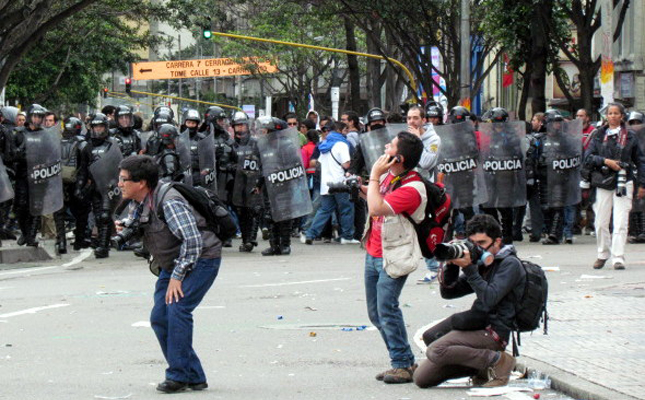Many of our readers are likely already aware of last week’s announcement of the end of Cambio, perhaps Colombia’s most important source for investigative journalism. While the Casa Editorial El Tiempo, which owns Cambio, claims that the decision to turn this weekly investigative magazine into a monthly magazine on tourism and travel reflects market trends, the magazine’s now fired editor Maria Elvira Samper and director Rodrigo Pardo claim the decision was a direct result of the magazine’s investigative work. The two have shared numbers on the magazine’s profits, which make a strong case. The Casa Editorial El Tiempo is owned by the Spanish Grupo Planeta-the Spanish speaking world’s largest publisher-and the Santos family (same one as current Vice-President Santos and former Defense Minister Santos). Regardless of the specific reasons that led the Editorial Board to close down Cambio, its disappearance is a loss to Colombian democracy.
Since its founding in 1994 Cambio has played a crucial role in providing journalistic oversight over politicians’ corrupt doings. In 1995 Cambio journalist Maria Cristina Caballero began to reveal presidential candidate Ernesto Samper’s supposed links to the Cali Cartel, in what then led to the ‘Proceso 8000’. Just last year, Cambio reported in August on Colombia’s growing urban insecurity, arguing it could be President Uribe’s security policy’s Achilees Heel. Then in October Cambio broke the story on Agro Ingreso Seguro (AIS), a program managed by Colombia’s Ministry of Agriculture that was intended to benefit small rural land holders, but was used instead to channel millions of state dollars to some of Colombia’s most prominent large landowners. This nation-wide scandal directly implicated President Uribe’s former Agriculture Minister, Andrés Felipe Arias, who had quit his post in order to run for the presidency if Uribe is unable to this year. Two weeks later the magazine leaked sections of the secret agreement between the United States and Colombia that would allow the U.S. to use a number of Colombian bases, which led to the worse diplomatic spat Colombia has had with its neighbors in recent memory. In November 2009 Cambio published a summary of a report by the think tank Corporación Nuevo Arcoiris that argeud that President Uribe’s seguridad democrática strategy had reached its peak and was beginning to show its weak spots. These and other reports, as one can imagine, made many uncomfortable and earned the magazine and its leadership strong criticism from government officials.
On February 3rd Samper and Pardo were told they would have to step down in 3 weeks and they decided to dedicate their next issue to explaining why Cambio was being shut down. But their work was stopped short. On February 8th they were asked to leave immediately and the magazine’s latest issue went unpublished.
Election season, perhaps more than any other time, requires strong press oversight, and so Cambio will be especially missed in the coming months. Although none of the following publications can compare to Cambio‘s analytical and investigative capacity, for those who were counting on Cambio for analysis and information on the upcoming elections, here are a few alternate recommendations:
—Votebien.com: This webpage, which has existed since the 2002 elections, is the result of an alliance among journalistic entities with the purpose of helping Colombians inform themselves about upcoming elections. Some of the best analytical work on candidates, parties, and the elections themselves will be found here. Semana, Terra, Caracol Radio, Colprensa, Fescol, Congreso Visible, UNDP, and the Colombian chapter of Transparency International are all partners. The website has a very complete guide for journalists covering the elections, which is helpful for anyone who wants to better understand Colombia’s electoral system.
—Congresovisible.org: This project, started in 1998 by the Universidad de los Andes’ Political Science Department, seeks to provide follow-up and analysis on congressional politics. The website is mostly useful for its statistical tools. The “Candidates 2010” section of Congreso Visible will hopefully be one of the most useful tools in tracking the upcoming March elections.
—Elecciones.com.co: This recently-launched private website seeks to provide easy-to-read information on every candidate and the ability to compare them side-by-side, similar to the service Glass Booth offers for U.S. elections. It does not provide analysis, but allows you to see how every candidate is profiling him/herself. While a month away from Congressional elections it still lacks information on many candidates, the website is definitely gaining steam and could become a useful source of information.
—Lasillavacia.com: Funded by the Open Society, this small online publication has published some of the best in-depth analysis into parties and candidates so far. A recent article profiles many of the top candidates as seen by their right-hand men/women.
—Verdadabierta.com: This webpage is the result of an agreement between the magazine Semana and the think-tank Ideas para la Paz with the purpose of working together in order to get to the truth about the conflict in Colombia. The “Parapolitics” section will hopefully soon be an important source in order to understand the role that politicians who may have ties with paramilitarism will have in the 2010 elections.
—RazónPública.com: This non-profit organization publishes analysis and opinion pieces by Colombian intellectuals with the purpose of furthering debate on political issues. While so far much of the debate is about the possibility of amending the constitution to allow Uribe’s re-election, this website will surely provide strong analysis as the elections draw near.
If you know of any other useful sources, please comment below.

Reply